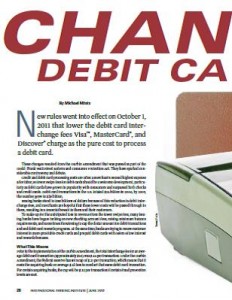New rules went into effect on October 1, 2011 that lower the debit card interchange fees Visa™, MasterCard®, and Discover® charge as the pure cost to process a debit card.
These changes resulted from the Durbin Amendment that was passed as part of the Dodd–Frank Wall Street Reform and Consumer Protection Act. They have sparked considerable controversy and debate.
Credit and debit card processing costs are often a merchant’s second highest expense after labor, so lower swipe fees for debit cards should be a welcome development, particularly as debit cards have grown in popularity with consumers and surpassed both checks and credit cards. Debit card transactions in the U.S. totaled $25 billion in 2006; by 2009, the number grew to $38 billion.
Issuing banks stand to lose billions of dollars because of this reduction in debit interchange fees, and merchants are hopeful that these lower costs will be passed through to them, resulting in a financial benefit to them and their customers.
To make up for the anticipated loss in revenue from the lower swipe fees, many issuing banks have begun tacking on new checking account fees, raising minimum balance requirements, and sometimes threatening to cap the dollar amount for debit transactions and end debit card rewards programs. At the same time, banks are trying to renew customer interest in more profitable credit cards and prepaid debit cards with offers of low interest and rewards bonuses.
What This Means
Prior to the implementation of the Durbin Amendment, the total interchange fee for an average debit card transaction (approximately $50) was $.44 per transaction. Under the Durbin Amendment, the Federal Reserve has set a cap of $.21 per transaction, which means that it costs the acquiring bank on average $.23 less to conduct that same debit card transaction. For certain acquiring banks, the cap will be $.22 per transaction if certain fraud prevention levels are met.
It is important to note that the new rules apply only to Visa™, MasterCard®, and Discover® debit cards, (not credit cards) and only to issuing banks with more than $10 billion in assets.
So, what’s the bottom line for parking facilities that accept debit cards? It depends on one simple thing: how is your merchant account priced?
If you are on a fixed rate or three-tier pricing program, the reduced cost to process a debit card will likely go right into the acquirer/processor/ISO/bank’s pocket. In fact, there are many merchant services providers that have used this change to debit card interchange fees as a reason to increase their clients’ overall fee structures.
If you are on interchange or cost PLUS pricing, these savings will be directly passed through to your business. However, there is a catch for merchants that process very small dollar amount transactions (see below).
Merchants that accept a large number of debit cards and have an average ticket of $20 or more should see a significant cost reduction as a result of the new debit card interchange fees.
The Catch
Unfortunately, certain sectors of the parking industry will not see a reduction in their debit fee costs even if they are priced on interchange or cost PLUS pricing. With the passing of the Durbin Amendment and the implementation of a new debit interchange fee structure, the card associations also did away with the small ticket debit interchange category. This small ticket debit interchange category had provided a favorable cost structure for transactions of less than $15. While the discount rate for debit transactions is now only 0.05 percent (down from 1.55 percent), the “per item” interchange fee went from $0.04 to $0.21.
A city or municipality that sees typical transactions in the $2 to $10 range will not see lower rates to offset the higher “per item” fee and, therefore, will likely experience a higher cost for accepting debit cards from their customers.
As you can see from the above chart, small ticket debit transactions now cost the acquirer/processor significantly more than they did prior to the changes in debit interchange costs. For merchants on interchange or cost PLUS pricing, these additional costs are being passed through.
Merchant service providers have used this debit cost change to implement overall fee increases to their clients who are doing a lot of small ticket debit transactions not on interchange or cost PLUS pricing. Unfortunately, these increases are not only being assessed to small ticket debit transactions, but to all credit and debit card transactions. This has become another way for merchant service providers to make more money from their clients.
Michael Mintz is president of MCM Sales and Consulting, LLC and parking industry consultant to AMG Payment Solutions.He can be reached at mmintz@amgpay.com or 973.821.4041.
TPP-2012-06-Changing Debit Card Rules

